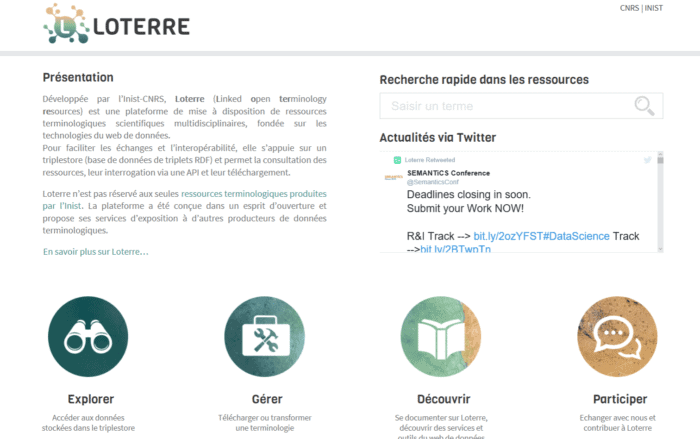
In France, the Institut de l’information scientifique et technique (Inist, Institute for Scientific and Technical Information) attached to the Centre national de la recherche scientifique (CNRS, National Centre for Scientific Research) have recently developed a platform where they offer terminological resources from different scientific fields. The name of this platform is Loterre, which is the acronym for Linked Open Terminology Resources.
As the ‘Linked’ in the name implies, the platform is based upon Linked Data, a method for retrieving data that is semantically related. Loterre was conceived as a metaresource which linguists and other professionals can now use to look for scientific terms in different terminological resources simultaneously. Some of these were developed by the Inist, and most of them are actually controlled vocabularies, which facilitate finding terminological data.
Resources offered by the Inist are distributed under a Creative Commons license that allows sharing and adapting, so that they can be further distributed. Loterre also gathers resources created by third parties, provided that the resources have a license of use and are produced by the proponents themselves. All that these proponents need to do is to fill in the questionnaire available on the website. If the resource is considered appropriate for Loterre, it will be featured and included for searches there.

For now, the website is available in French only, but the authors are currently considering localizing it in English and Spanish. As far as languages are concerned, it currently contains different glossaries, term lists, thesauri and taxonomies in several languages. They can be either monolingual (the language must be French or English for them to be included on the website) or multilingual (one of the languages contained must be French or English). Users can look for terms in one of these two required languages, as well as in Spanish and German.
One of the highlights of Loterre is the option to download resources. These can be downloaded in several formats, so users can choose whether to consult them in PDF or in some other format. For example, a glossary on a specific field can be downloaded in the CSV or the XML format and then converted to a terminological database. This allows translators to use them with their CAT tools locally.
As for the topics covered, these are currently limited to some branches of Humanities, Physics, Engineering and Health Sciences. However, given the collaborative, open nature of Loterre and the fairly recent start-up of the website (it only began operating in March 2018), it can be expected to grow in the mid‑term. The glossaries available now are being added to Glossary Links in our website as well, and you will be able to check them there briefly. So here is a resource of resources to watch out for the future.
Corrections:
We thank Nathalie Vedovotto for bringing to our attention to the name of the Inist, since it was incorrectly rendered in the first version of the article as “Institute de l’information scientifique” and translated as “Institute of Scientific Information”. We would also like to thank her for informing us about their intention to localize the website in other languages.
Written by: M. Isabel Bolívar, Terminology trainee at the European Parliament since January 2018. Isabel is from Spain, she holds a Bachelor and a Master Degree in Translation and Interpreting from the University of Granada, and is specialized in scientific and medical translation. Her languages are English and French and, of course, Spanish.
